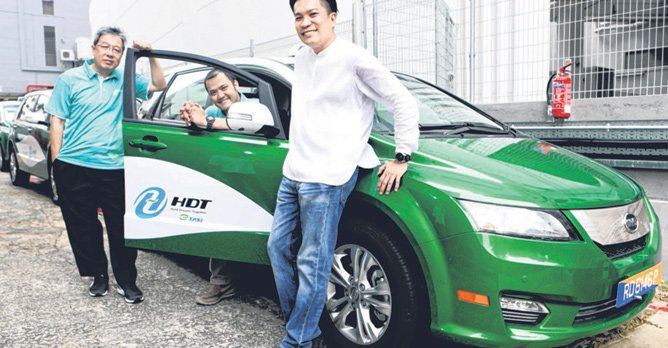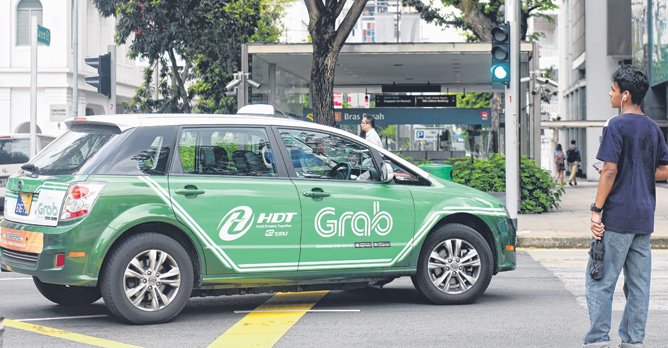HDT taxi drivers to get more training support
28 Jan 2019|1,002 views
Experienced cabbies under electric taxi operator HDT will now be eligible to become mentors for new cabbies, and may even receive an additional allowance when they do so.

These were just some of the initiatives announced at the signing of a Memorandum of Understanding (MOU) between the National Taxi Association (NTA), HDT Singapore Taxi and NTUC's Employment and Employability Institute (e2i) on Saturday (26 January).
Under the MOU, full-time HDT taxi drivers will also become members of the NTA. Their membership fees will be borne by HDT.
HDT is a taxi company which was established here in 2016 and runs only electric cars for its taxi service. In 2018, it was granted a 10-year full Taxi Service Operator Licence to grow its fleet to 800 vehicles. HDT is currently in a partnership with ride-hailing firm Grab, allowing its drivers to get booking jobs from the latter.
Saturday's MOU aims to help full-time HDT cabbies keep up with digital transformation, as well as assist them with their career progression. Some 800 full-time HDT taxi drivers will go through SkillsFuture training on digital skills for the workplace in the next five years under the MOU.
NTA and HDT will co-pay the training fees, with NTUC LearningHub as the key training provider. Cabbies who wish to move out of their driving roles will get access to training programmes to help them to do so. This is expected to help improve their prospects for career progression.

At least one such collaboration currently exists, the Place-and-Train programme.
As part of this programme, drivers are given 80 hours to get a sense of what it is like to drive an electric car.
Potential hires are paid on an hourly basis at a rate of about $7.50 an hour. Since its launch in 2017, more than 80 drivers have gone on the programme and subsequently become full-time drivers.
NTA said that with the signing of the MOU, the partners are committed to do more.
Managing Director of HDT Singapore Taxi James Ng said the MOU will take the company "another step forward, to provide an even better environment to support and encourage (its) drivers."
NTA Executive Advisor Ang Hin Kee said, "Taxi drivers have to keep up with digital transformation and find new ways to earn more. We hope to help them with training so that they can keep up with changes."
Experienced cabbies under electric taxi operator HDT will now be eligible to become mentors for new cabbies, and may even receive an additional allowance when they do so.

These were just some of the initiatives announced at the signing of a Memorandum of Understanding (MOU) between the National Taxi Association (NTA), HDT Singapore Taxi and NTUC's Employment and Employability Institute (e2i) on Saturday (26 January).
Under the MOU, full-time HDT taxi drivers will also become members of the NTA. Their membership fees will be borne by HDT.
HDT is a taxi company which was established here in 2016 and runs only electric cars for its taxi service. In 2018, it was granted a 10-year full Taxi Service Operator Licence to grow its fleet to 800 vehicles. HDT is currently in a partnership with ride-hailing firm Grab, allowing its drivers to get booking jobs from the latter.
Saturday's MOU aims to help full-time HDT cabbies keep up with digital transformation, as well as assist them with their career progression. Some 800 full-time HDT taxi drivers will go through SkillsFuture training on digital skills for the workplace in the next five years under the MOU.
NTA and HDT will co-pay the training fees, with NTUC LearningHub as the key training provider. Cabbies who wish to move out of their driving roles will get access to training programmes to help them to do so. This is expected to help improve their prospects for career progression.

At least one such collaboration currently exists, the Place-and-Train programme.
As part of this programme, drivers are given 80 hours to get a sense of what it is like to drive an electric car.
Potential hires are paid on an hourly basis at a rate of about $7.50 an hour. Since its launch in 2017, more than 80 drivers have gone on the programme and subsequently become full-time drivers.
NTA said that with the signing of the MOU, the partners are committed to do more.
Managing Director of HDT Singapore Taxi James Ng said the MOU will take the company "another step forward, to provide an even better environment to support and encourage (its) drivers."
NTA Executive Advisor Ang Hin Kee said, "Taxi drivers have to keep up with digital transformation and find new ways to earn more. We hope to help them with training so that they can keep up with changes."
Latest COE Prices
February 2026 | 2nd BIDDING
NEXT TENDER: 04 Mar 2026
CAT A$106,501
CAT B$105,001
CAT C$74,999
CAT E$112,890
View Full Results Thank You For Your Subscription.



















